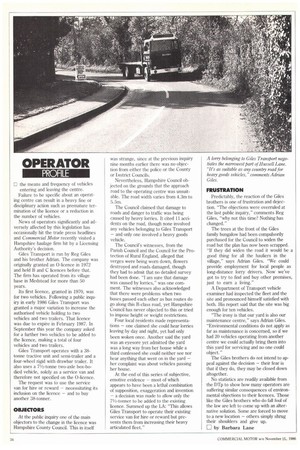OPERATOR
Page 36

If you've noticed an error in this article please click here to report it so we can fix it.
PROFILE
0 the means and frequency of vehicles entering and leaving the centre.
Failure to be specific about an operating centre can result in a heavy fine or disciplinary action such as premature termination of the licence or a reduction in the number of vehicles.
News of operators significantly and adversely affected by this legislation has occasionally hit the trade press headlines and Commercial Motor recently visited a Hampshire haulage firm hit by a Licensing Authority's decision.
Giles Transport is run by Reg Giles and his brother Adrian. The company was originally granted an 0-licence in 1972 and held B and C licences before that. The firm has operated from its village base in Medstead for more than 50 years.
Its first licence, granted in 1970, was for two vehicles. Following a public inquiry in early 1986 Giles Transport was granted a major variation to increase the authorised vehicle holding to two vehicles and two trailers. That licence was due to expire in February 1987. In September this year the company asked for a further two vehicles to be added to the licence, making a total of four vehicles and two trailers.
Giles Transport operates with a 38tonne tractive unit and semi-trailer and a four-wheel rigid with drawbar trailer. It also uses a 71/2-tonne two-axle box-bodied vehicle, solely as a service van and therefore not specified on the 0-licence.
The request was to use the service van for hire or reward — necessitating its inclusion on the licence — and to buy another 38-tonner.
OBJECTORS
At the public inquiry one of the main objectors to the change in the licence was Hampshire County Council. This in itself was strange, since at the previous inquiry nine months earlier there was no objection from either the police or the County or District Councils.
Nevertheless, Hampshire Council objected on the grounds that the approach road to the operating centre was unsuitable. The road width varies from 4.3m to 5.5m.
The Council claimed that damage to roads and danger to traffic was being caused by heavy lorries. It cited 11 accidents on the road, though none involved any vehicles belonging to Giles Transport — and only one involved a heavy goods vehicle.
The Council's witnesses, from the Parish Council and the Council for the Protection of Rural England, alleged that verges were being worn down, flowers destroyed and roads damaged, though they had to admit that no detailed survey had been done. "I am sure that damage was caused by lorries," was one comment. The witnesses also acknowledged that there were problems when two buses passed each other as bus routes do go along this B-class road, yet Hampshire Council has never objected to this or tried to impose height or weight restrictions.
Four local residents made representations — one claimed she could hear lorries leaving by day and night, yet had only been woken once. Another said the yard was an eyesore yet admitted the yard was a long way from her house while a third confessed she could neither see nor hear anything that went on in the yard — her complaint was about vehicles passing her house.
At the end of this series of subjective, emotive evidence — most of which appears to have been a lethal combination of supposition, exaggeration and invention — a decision was made to allow only the 71/2-tonner to be added to the existing licence. Summed up the LA: "This allows Giles Transport to operate their existing service van for hire or reward but prevents them from increasing their heavy articulated fleet." A lorry belonging to Giles Transport negotiates the narrowest part of Hu.ssell Lane. "It's as suitable as any country road for heavy goods vehicles," comments Adrian Giles.
FRUSTRATION
Predictably, the reaction of the Giles brothers is one of frustration and dejection. "The objections were overruled at the last public inquiry," comments Reg Giles, "why not this time? Nothing has changed."
The trees at the front of the Giles family bungalow had been compulsorily purchased for the Council to widen the road but the plan has now been scrapped. "If they did widen the road it would be a good thing for all the hauliers in the village," says Adrian Giles. "We could provide employment for local people as long-distance lorry drivers. Now we've got to try to find and buy other premises, just to earn a living."
A Department of Transport vehicle examiner had inspected the fleet and the site and pronounced himself satisfied with both. His report said that the site was big enough for ten vehicles.
"The irony is that our yard is also our maintenance centre," says Adrian Giles. "Environmental conditions do not apply as far as maintenance is concerned, so if we had 20 vehicles operating from another centre we could actually bring them into this yard for servicing and no one could object."
The Giles brothers do not intend to appeal against the decision — their fear is that if they do, they may be closed down altogether.
No statistics are readily available from the DTp to show how many operators are suffering similar consequences of environmental objections to their licences. Those like the Giles brothers who do fall foul of the law are left to come up with an alternative solution. Some are forced to move to a new location — others simply shrug their shoulders and give up.
0 by Barbara Lane






























































































